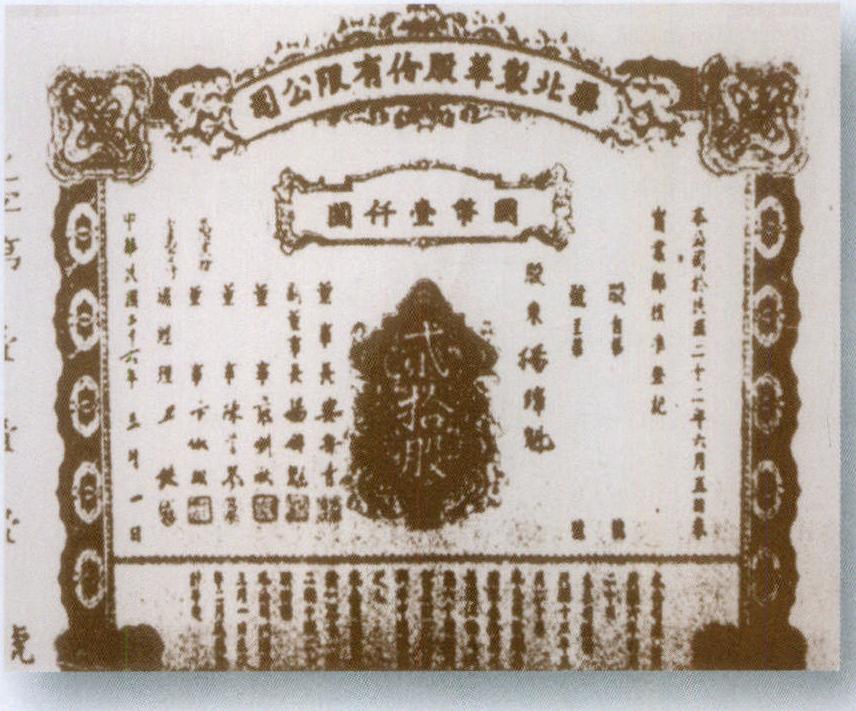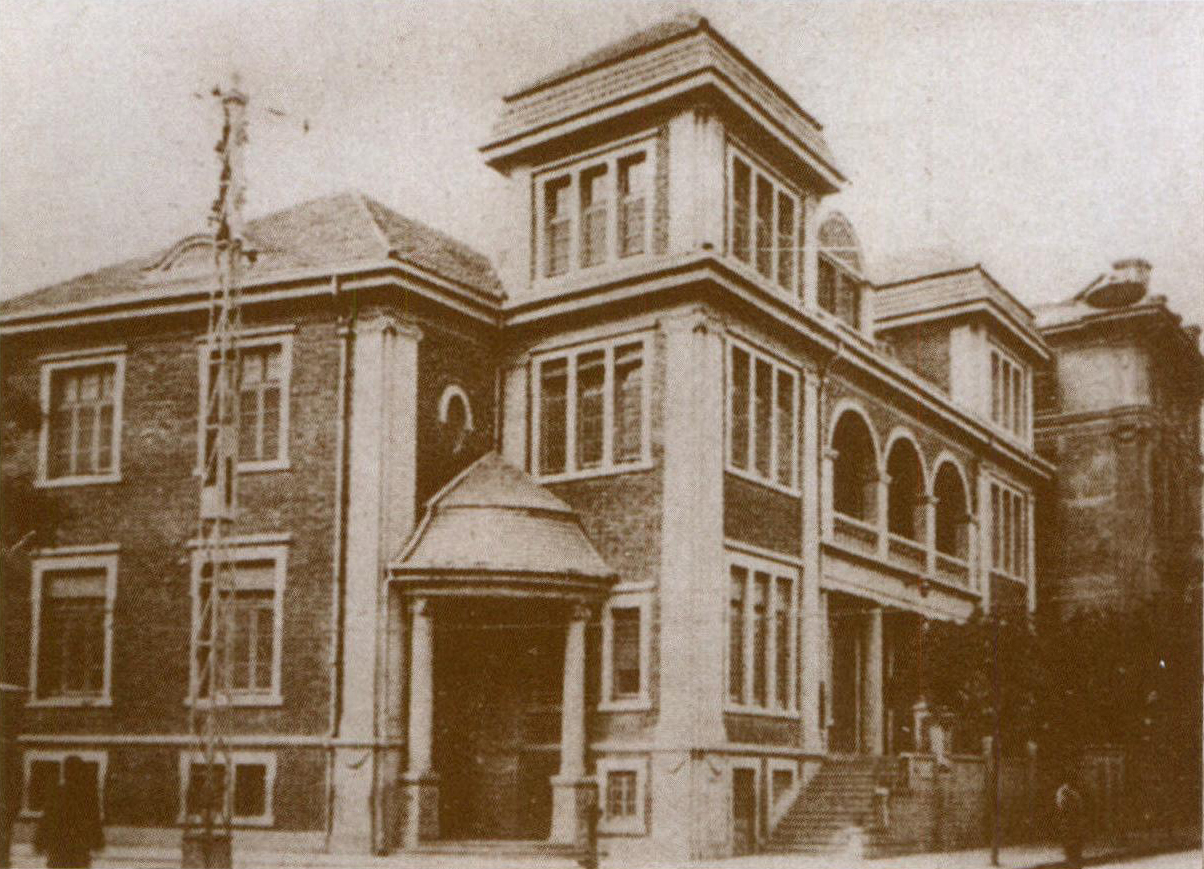历史百科 中国最早的股票及交易所
Posted 股票
篇首语:我希望在颠沛流离之后,还能够重新遇见温暖的你,那时候,你刚好成熟,而我,刚好学会温柔。本文由小常识网(cha138.com)小编为大家整理,主要介绍了历史百科 中国最早的股票及交易所相关的知识,希望对你有一定的参考价值。
历史百科 中国最早的股票及交易所
股票产生于17世纪的欧洲,到19世纪后半期,广泛流传于各国。
清光绪三年(1877)九月,筹办中的开平矿务局拟定了招商章程十二条。光绪四年(1878)六月二十五日,正式创办开平矿务局,局址设在海大道(今大沽路)。矿务局成立的当年,计划招股80万两,实际上招到了20余万两; 光绪六年(1880),筹集到30万两; 到光绪七年(1881)开始出煤以后,投资者大增,仅在上海便筹集私人股金100多万两,官僚盛宣怀也收买矿务局股票二百五六十股。这是中国最早的股份制企业和??早的股票。
随着股份制企业的增多,股票买卖也活跃起来,股票交易场所也相应建立。清光绪三十四年(1908)十月二十六日,北洋股票交通有限公司成立。地址在北马路工业售品所内,这是天津??早的股票交易所。
1918年8月18日,天津证券交易会在江苏会馆设立,选举史康侯等11人为理事。1921年2月,经北京政府农商部批准立案,天津证券、花纱、粮食、皮毛交易所,于同年10月1日开业,俗称天津证券物品交易所。理事长为曹钧(曹锟之弟),资本总额250万元。营业项目名义上是4种,但拍板成交的却以证券为主; 在成交的证券中,又以本所股票为最多。所以,实际上它是天津第一家正式证券交易所。
天津成立股票、证券交易所,在全国是??早的,但破产的也较快。自1922年5月以后的20多年中,天津没有正式的证券交易所。一切交易都以北京交易??为市场,又以上海证券市场为转移。然而,天津毕竟有雄厚的金融基础,股票的交易,在没有正式交易所的情况下,依然进行。虽然由于政局的动荡和其他因素的影响,其波动较大,可是总的走向是发展的趋势。
“九一八”事变后,公债买卖疲沓,股票交易取而代之。特别是银行的股票,得利丰厚。由于股票价格不断上涨,成交颇多; 5家大的股票行成立联合办事处,买卖华北、上海各种股票和公债。其中以启新洋灰公司股票成交额最大。1939年2月,国民政府宣布停止对公债还本付息,公债买卖结束,股票买卖便占据了整个证券市场。1941年天津的证券行,发展到四五十家; 1945年初,达到98家。

·原华北制革股份有限公司股票
1945年8月27日,天津银行业同业公会负责组织的华北有价证券交易所,在法租界中街前六国饭店开业,专营证券交易,理事长为天津银行业同业公会主委、金城银行经理王毅灵。上市股票原定26种,实际开做的只有启新洋灰公司等五六种。
1948年2月16日,天津证券交易所开业。所??在华北有价证券交易所原址,交通银行经理李钟楚为理事长。批准经纪人近百家,上市证券有各大企业股票13家。
天津解放后,1949年6月1日,成立天津市证券交易所,军代表孙及民为经理,有经纪人39家,上市证券为各大公司股票。1952年7月19日,天津市证券交易所撤销,其买卖由天津市投资公司办理,后又改为交通银行兼营。1956年公私合营后,股票交易停止。历史上,天津的股票交易,开始最早,结束的也最晚。
Stocks were first created in the 17th century in Europe asthe industries developed; it spred quickly among everycountry by the later half of the 19th century,of courseincluding China.
In September 1877 (the third year of EmperorGuangxu),the in-preparation Kaiping Mineral Bureaudrafted the Twelve-article Attracting Investment Rules.In June 25th 1878 (the fourth year of Emperor Guangxu),Li Hongzhang ordered Tang Tingshu to officially foundKaiping Mineral Bureau. The bureau was located inHaida Road (now Dagu Road). They planned to raise800 thousand silver dollars in the year of the foundation.Actually they raised only 200 plus thousand silverdollars. In 1880,they raised 300 thousand silver dollar.In 1881 when coals were produced,capital investmentincreased greatly. More than one million silver dollarsfrom personal investment were raised in Shanghai. Thebureaucrat Sheng Xuanhuai also bought around 260shares of the bureau stocks. The increasing of personalinvestment stimulated the rising of stock price of thebureau. This was the earliest stock company and theearliest stock issued in China.
With the increasing of stock companies,stockexchange also became active. Buildings for stockexchange were constructed accordingly. In October26,1908(the 34th year of Emperor Guangxu),BeiyangStock Exchange Co.Ltd was founded and located inthe Industrial Sales Store in North Road.This was theearliest stock exchange in Tianjin. Tianjin IndustrialSales Department Store General was the earliestdepartment store in Tianjin and it was founded in August3rd 1907(the 33rd year of Emperor Guangxu).
In August 18,1918,Tianjin Stock Exchange Co.Ltd elected eleven people including Shi Kanghou asthe board members in its Jiangsu branch. In February1921,approved by and registered in the Ministry ofAgriculture and Trade,Tianjin stock,yarn,grain andfur exchanges were established,and they started theirservice in October 1st in the same year. These exchangeswere also called Tianjin Stock and Goods Exchangewith total capital of 2.5 million Yuan. The director of theboard was Cao Jun (the younger brother of Cao Kun).Nominally,its business covered four kinds of goods.However,it mainly dealt in stock exchange. Most of thestocks exchanged were stocks of theirs own company.Therefore,it was in fact the first formal stock exchangein Tianjin.
The stock exchange in Tianjin was the earliest inChina. However,it quickly went bankrupt. In more thantwenty years following that,no formal stock exchangeexisted in Tianjin. All stock business was done inBeijing Stock Exchange and transferred in ShanghaiStock Exchange. However,with solid capital base,stockexchange still continued,although there was no formalstock exchange center. The business of stock exchangestill developed,although there was lots of fluctuationdue to political upheaval and other factors.
After the "9.18 Event" in 1931,exchange of publicbonds became weak and was gradually replaced bystock exchange. Exchange of bank stocks was especiallyprofitable. Since price of stocks increased continuously,deals of stock exchange also soared up. Five large stockexchanges combined to set up a joint branch for buyingand selling stocks and government bonds in Shanghaiand north China. Among deals of stock exchanges,Qixin Cement Company occupied a big share. InFebruary 1939,the KMT government declared not toreturn capital and to pay interest for government bonds.Exchange of government bonds was ended and stockexchange occupied the whole market. The number ofstock exchanges in Tianjin reached around 50 in 1941and 98 at the beginning of 1945.
In August 27,1945,North China Security Exchangeorganized by Tianjin Bank Association was open toservice in Liuguo Hotel in the Middle Street in theFrench concession. It dealt with security exchange. Thedirector of board was the chairman of Tianjin BankAssociation and manager of Jincheng Bank,WangYiling. It had planned to deal in exchange of 26 stocks.However,there were only five to six stocks beingexchanged including Qixin Cement Company.
In February 16,1948,Tianjin Stock Exchangelocated in the original address of North China SecurityExchange opened to service. The director of board wasthe manager of Communication Bank Li Zhongchu. Itapproved around 100 brokers and dealt in exchange ofstocks of 13 enterprises.
After the liberation,Tianjin City Stock Exchangewas founded in June 1,1949. The director was the armyrepresentative Sun Jimin. It had 39 brokers and dealt inexchange of stocks of many enterprises. In July 19,1952,Tianjin City Stock Exchange was cancelled and itsbusiness was done by Tianjin Investment Company.Later,stock exchange was done by the CommunicationBank currently. In 1956,stock exchange was stoppedafter combination of public and private enterprises. Inhistory,stock exchange in Tianjin started the earliest andended the latest.

·启新洋灰公司
相关参考
在美元指数一路走贬的提振下,国际金价在长假期间大幅攀升,纽约商品交易所黄金期货8日连续第三个交易日创出历史新高,一举改写去年3月触及的纪录高位,并在周四盘中触及1061美元的历史新高。中国的金矿股票:
1、大宗交易:又称为大宗买卖,是指达到规定的最低限额的证券单笔买卖申报,买卖双方经过协议达成一致并经交易所确定成交的证券交易。大宗交易针对的是一笔数额较大的证券买卖。我国现行有关交易制度规则,如果证券
1、股票交易佣金是指在股票交易时需要支付的款项,股票交易手续费分三部分:印花税、过户费、证券监管费。券商交易佣金最高为成交金额的3‰,最低5元起,单笔交易佣金不满5元按5元收取。2、印花税由政府收取;
影响有:1、大宗交易如果折价太多,则股价一般不好,会跟随下跌2、如果是平价或小幅度折价,则对二级市场有一定的支撑,甚至推升股价3、大宗交易的时间也要和股票的价格位置的高低配合起来观察,如果是在低位,则
MLDownloader我以下下载过这个破解软件,可以自行下载数据,现在没用了。刚才用了下,还可下载。但不知道你有何用。估计好多公司都破产了,以前的。破产的公司就不会有数据了,除非你到图书馆去查。例如
技术人员总是说“一切尽在图表之中”“随机漫步者”却会说“胡说八道”“一个人根本无法根据图表来预测未来的价格因为股票价格的运动是随机的。股票当前的价格反映了所有可以获得的消息以及对公司商业前景的预期因此
技术人员总是说“一切尽在图表之中”“随机漫步者”却会说“胡说八道”“一个人根本无法根据图表来预测未来的价格因为股票价格的运动是随机的。股票当前的价格反映了所有可以获得的消息以及对公司商业前景的预期因此
一、怎样查询股票帐户历史交易明细登录你的股票软件,在交易界面找到“查询”,或者“搜索”选项。虽然股票交易软件可能不一样,不过类似功能肯定大同小异。搜索选项或者查询选项,一般都是用一个放大镜图标表示。在
一桩钱与权的交易——日本里库路特股票丑闻1988—1989年,日本竹下内阁的3位大臣先后不体面地下了台。他们是大藏相宫泽喜一、法务相长谷川峻、经济企划厅长官原田宪。紧接着,以“忍”著称的竹下首相本人也
中国资本市场和西方资本市场有哪些区别中国资本市场和西方资本市场的主要区别:一是发展历程的不同。中国的资本市场只有20多年的历史(尽管清朝末期、民国时期也有债券、股票交易,但未能延续下来,与当代中国的资